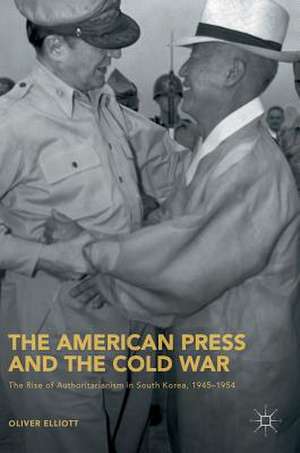The American Press and the Cold War: The Rise of Authoritarianism in South Korea, 1945–1954
Autor Oliver Elliotten Limba Engleză Hardback – 11 mai 2018
| Toate formatele și edițiile | Preț | Express |
|---|---|---|
| Paperback (1) | 727.97 lei 6-8 săpt. | |
| Springer International Publishing – 8 feb 2019 | 727.97 lei 6-8 săpt. | |
| Hardback (1) | 831.05 lei 6-8 săpt. | |
| Springer International Publishing – 11 mai 2018 | 831.05 lei 6-8 săpt. |
Preț: 831.05 lei
Preț vechi: 1013.48 lei
-18% Nou
Puncte Express: 1247
Preț estimativ în valută:
159.03€ • 167.22$ • 131.40£
159.03€ • 167.22$ • 131.40£
Carte tipărită la comandă
Livrare economică 16-30 aprilie
Preluare comenzi: 021 569.72.76
Specificații
ISBN-13: 9783319760223
ISBN-10: 331976022X
Pagini: 275
Ilustrații: XIII, 254 p. 4 illus.
Dimensiuni: 148 x 210 x 17 mm
Greutate: 3.42 kg
Ediția:1st ed. 2018
Editura: Springer International Publishing
Colecția Palgrave Macmillan
Locul publicării:Cham, Switzerland
ISBN-10: 331976022X
Pagini: 275
Ilustrații: XIII, 254 p. 4 illus.
Dimensiuni: 148 x 210 x 17 mm
Greutate: 3.42 kg
Ediția:1st ed. 2018
Editura: Springer International Publishing
Colecția Palgrave Macmillan
Locul publicării:Cham, Switzerland
Cuprins
1. Introduction.- 2. Occupation 1945–46: Hope and failure.- 3. Occupation 1947–48: Division and independence.- 4. The ROK Problem 1948–1950.- 5. War 1950–1951.- 6. The 1952 Crisis: Rhee's Takeover.- 7. The Rise of the ROKA.- 8. Legacies of War.- 9. Conclusions.
Notă biografică
Oliver Elliott has taught at the London School of Economics and Political Science, U.K., where he earned his PhD in International History.
Textul de pe ultima copertă
During the Cold War, the United States enabled the rise of President Syngman Rhee’s repressive government in South Korea, and yet neither the American occupation nor Rhee’s growing authoritarianism ever became particularly controversial news stories in the United States. Could the press have done more to scrutinize American actions in Korea? Did journalists fail to act as an adequate check on American power? In the first archive-based account of how American journalism responded to one of the most significant stories in the history of American foreign relations, Oliver Elliott shows how a group of foreign correspondents, battling U.S. military authorities and pro-Rhee lobbyists, brought the issue of South Korean authoritarianism into the American political mainstream on the eve of the Korean War. However, when war came in June 1950, the press rapidly abandoned its scrutiny of South Korean democracy, marking a crucial moment of transition from the era of postwar idealism to the Cold Warnorm of American support for authoritarian allies.
Caracteristici
Features the first scholarly study of American press coverage of South Korea in the 1940s and 1950s Examines the political, military, institutional, cultural, ideological, and personal factors that influenced American journalists covering South Korea Documents the largely forgotten stories of the foreign correspondents who sought to warn the United States about the rise of authoritarianism in South Korea as well as the efforts of the South Korean government to influence American public opinion Appeals to scholars of U.S. foreign relations, Cold War history, Korean history, and history of journalism
